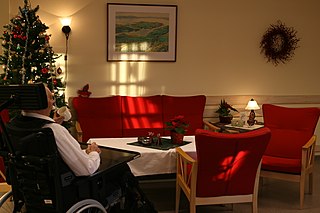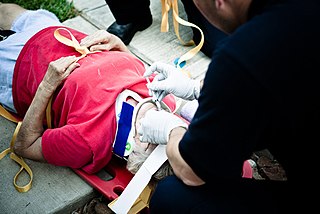Related Research Articles
Delirium is a specific state of acute confusion attributable to the direct physiological consequence of a medical condition, effects of a psychoactive substance, or multiple causes, which usually develops over the course of hours to days. As a syndrome, delirium presents with disturbances in attention, awareness, and higher-order cognition. People with delirium may experience other neuropsychiatric disturbances, including changes in psychomotor activity, disrupted sleep-wake cycle, emotional disturbances, and perceptual disturbances, although these features are not required for diagnosis.

An emergency department (ED), also known as an accident and emergency department (A&E), emergency room (ER), emergency ward (EW) or casualty department, is a medical treatment facility specializing in emergency medicine, the acute care of patients who present without prior appointment; either by their own means or by that of an ambulance. The emergency department is usually found in a hospital or other primary care center.

Geriatrics, or geriatric medicine, is a medical specialty focused on providing care for the unique health needs of older adults. The term geriatrics originates from the Greek γέρων geron meaning "old man", and ιατρός iatros meaning "healer". It aims to promote health by preventing, diagnosing and treating disease in older adults. There is no defined age at which patients may be under the care of a geriatrician, or geriatric physician, a physician who specializes in the care of elderly people. Rather, this decision is guided by individual patient need and the caregiving structures available to them. This care may benefit those who are managing multiple chronic conditions or experiencing significant age-related complications that threaten quality of daily life. Geriatric care may be indicated if caregiving responsibilities become increasingly stressful or medically complex for family and caregivers to manage independently.

Polypharmacy (polypragmasia) is an umbrella term to describe the simultaneous use of multiple medicines by a patient for their conditions. Most commonly it is defined as regularly taking five or more medicines but definitions vary in where they draw the line for the minimum number of drugs. Polypharmacy is often the consequence of having multiple long-term conditions, also known as multimorbidity. An excessive number of medications is worrisome, especially for older patients with many chronic health conditions, because this increases the risk of an adverse event in those patients.

Elderly care, or simply eldercare, serves the needs of old adults. It encompasses assisted living, adult daycare, long-term care, nursing homes, hospice care, and home care.

Gerontological nursing is the specialty of nursing pertaining to older adults. Gerontological nurses work in collaboration with older adults, their families, and communities to support healthy aging, maximum functioning, and quality of life. The term gerontological nursing, which replaced the term geriatric nursing in the 1970s, is seen as being more consistent with the specialty's broader focus on health and wellness, in addition to illness.
Home automation for the elderly and disabled focuses on making it possible for older adults and people with disabilities to remain at home, safe and comfortable. Home automation is becoming a viable option for older adults and people with disabilities who would prefer to stay in the comfort of their homes rather than move to a healthcare facility. This field uses much of the same technology and equipment as home automation for security, entertainment, and energy conservation but tailors it towards old people and people with disabilities.
William H. Thomas, also known as Bill Thomas, is an American author, performer and authority on geriatric medicine and eldercare from New York State. In 2014, Thomas organized a 25-city "non-fiction" theatrical tour to launch his book and to promote the documentary film Alive Inside. He is the founder of The Eden Alternative, a philosophy and program that de-institutionalized nursing homes in all 50 states and worldwide over the past 20 years. A self-described “Nursing Home Abolitionist,” he is also creator of Green House Project, a long-term care approach where nursing homes are torn down and replaced with small, home-like environments. In 2005, the Robert Wood Johnson Foundation announced a five-year $10 million grant that would result in the creation of Green House projects in all fifty states. As a professor at The Erickson School at UMBC, Thomas led development of the nation's first emergency department designed for older adults.

Woodhull Medical Center, branded as NYC Health + Hospitals/Woodhull, is a health care system located in the Bedford-Stuyvesant section of Brooklyn, New York City, United States. Its focus is on preventing disease and promoting healthy lifestyles in the community of North Brooklyn through its fifteen centers. Woodhull Medical and Mental Health Center falls administratively under New York City Health and Hospitals Corporation. As of 2018, the current CEO is Gregory Calliste.
As populations age, caring for people with dementia has become more common. Elderly caregiving may consist of formal care and informal care. Formal care involves the services of community and medical partners, while informal care involves the support of family, friends, and local communities. In most mild-to-medium cases of dementia, the caregiver is a spouse or an adult child. Over time, more professional care in the form of nursing and other supportive care may be required medically, whether at home or in a long-term care facility. There is evidence that case management can improve care for individuals with dementia and the experience of their caregivers. Furthermore, case management may reduce overall cost and institutional care in the medium term. Millions of people living in the United States take care of a friend or family member with Alzheimer’s disease or a related dementia.

St. Luke's Hospital is a community hospital in Singapore that provides professional healthcare services. It was named after the patron saint of the medical profession, St Luke. St Luke's Hospital for the Elderly Sick was registered as a voluntary welfare organization in the Registry of Societies in October 1991. It was renamed to St Luke's Hospital in September 2004 to signify the hospital's role as a community hospital while retaining its focus on geriatric care. The idea of setting up community hospital was first mooted by a group of Christian doctors and nurses after a report from the Advisory Council on the Aged in 1988 raised important issues concerning the lack of adequate elderly care facilities in Singapore. A projection of the number of facilities and resources needed to provide adequate healthcare services to Singapore's aging population in 2030 revealed serious shortfalls. In response to the problem of inadequate healthcare facilities for the elderly, a group of 8 churches and Christian organizations including the Graduate Christian Fellowship and the Singapore Nurses' Christian Fellowship came together to set up St Luke's Hospital for the Elderly Sick. St Luke's Hospital is headed by a board of directors and various committees that oversee the daily operations of the hospital.
Holy Cross Hospital is a 501(c)(3) not-for-profit teaching hospital with revenue of $611 million located in Silver Spring, Maryland.

A hospital is a health care institution providing patient treatment with specialized health science and auxiliary healthcare staff and medical equipment. The best-known type of hospital is the general hospital, which typically has an emergency department to treat urgent health problems ranging from fire and accident victims to a sudden illness. A district hospital typically is the major health care facility in its region, with many beds for intensive care and additional beds for patients who need long-term care. Specialized hospitals include trauma centers, rehabilitation hospitals, children's hospitals, seniors' (geriatric) hospitals, and hospitals for dealing with specific medical needs such as psychiatric treatment and certain disease categories. Specialized hospitals can help reduce health care costs compared to general hospitals. Hospitals are classified as general, specialty, or government depending on the sources of income received.
Geriatric intensive care unit is a special intensive care unit dedicated to management of critically ill elderly.
Late-life depression refers to depression occurring in older adults and has diverse presentations, including as a recurrence of early-onset depression, a new diagnosis of late-onset depression, and a mood disorder resulting from a separate medical condition, substance use, or medication regimen. Research regarding late-life depression often focuses on late-onset depression, which is defined as a major depressive episode occurring for the first time in an older person.
Albert Siu is an internist and geriatrician and the Ellen and Howard C. Katz Chairman and Professor of the Brookdale Department of Geriatrics and Palliative Medicine at Mount Sinai Hospital in New York City. He is also the director of the Geriatric Research, Education, and Clinical Center at the James J. Peters VA Medical Center in The Bronx, a senior associate editor of Health Services Research, a senior fellow of the Brookdale Foundation and a former trustee of the Nathan Cummings Foundation.
West Health is a family of non-profit, nonpartisan organizations that includes the Gary and Mary West Foundation, a private foundation and the West Health Institute, an applied medical research organization, based in San Diego and the West Health Policy Center, based in Washington, D.C. Its mission is to lower healthcare costs to enable seniors to successfully age in place with access to high-quality, affordable health and support services that preserve and protect their dignity, quality of life and independence. West Health is solely funded by entrepreneurs and philanthropists Gary and Mary West.

Geriatric trauma refers to a traumatic injury that occurs to an elderly person. People around the world are living longer than ever. In developed and underdeveloped countries, the pace of population aging is increasing. By 2050, the world's population aged 60 years and older is expected to total 2 billion, up from 900 million in 2015. While this trend presents opportunities for productivity and additional experiences, it also comes with its own set of challenges for health systems. More so than ever, elderly populations are presenting to the Emergency Department following traumatic injury. In addition, given advances in the management of chronic illnesses, more elderly adults are living active lifestyles and are at risk of traumatic injury. In the United States, this population accounts for 14% of all traumatic injuries, of which a majority are just mainly from falls.

Healthcare in Belgium is composed of three parts. Firstly there is a primarily publicly funded healthcare and social security service run by the federal government, which organises and regulates healthcare; independent private/public practitioners, university/semi-private hospitals and care institutions. There are a few private hospitals. Secondly is the insurance coverage provided for patients. Finally, industry coverage; which covers the production and distribution of healthcare products for research and development. The primary aspect of this research is done in universities and hospitals.

Herzog Hospital is a geriatric-psychiatric hospital in West Jerusalem. It is the third largest hospital in the city. Herzog Hospital specializes in nursing care for the elderly. The director-general of the hospital is Jacob Haviv.
References
- ↑ Salvi, F.; Morichi, V.; Grilli, A.; Giorgi, R.; De Tommaso, G.; Dessì-Fulgheri, P. (2007). "The elderly in the emergency department: a critical review of problems and solutions". Journal of Internal and Emergency Medicine. 2 (4): 292–301. doi:10.1007/s11739-007-0081-3. PMID 18043874. S2CID 9461500.
- ↑ [Holy Cross Health, "Seniors Emergency Center" http://www.holycrosshealth.org/svc_emergency_seniorcenter.htm Archived 2011-01-20 at the Wayback Machine ]
- ↑ Kelley, Mary Lou; Parke, Belinda; Jokinen, Nancy; Stones, Michael; Renaud, Donna (January 2011). "Senior-friendly emergency department care: an environmental assessment". Journal of Health Services Research & Policy. 16 (1): 6–12. doi:10.1258/jhsrp.2010.009132. PMID 20660532. S2CID 24981348.
- ↑ Baker, Beth (27 January 2009). "A Silver Spring ER Aims to Serve Older Patients". The Washington Post . Retrieved 22 March 2015.
- ↑ National Public Radio, "An Emergency Room Built Specially For Seniors"
- ↑ The Record, "Elderly get ER care without usual chaos"
- ↑ MD News, "Emergency Services Designed Specifically With Seniors in Mind" Archived 2011-07-14 at the Wayback Machine
- ↑ The Record, "Elderly get ER care without usual chaos"